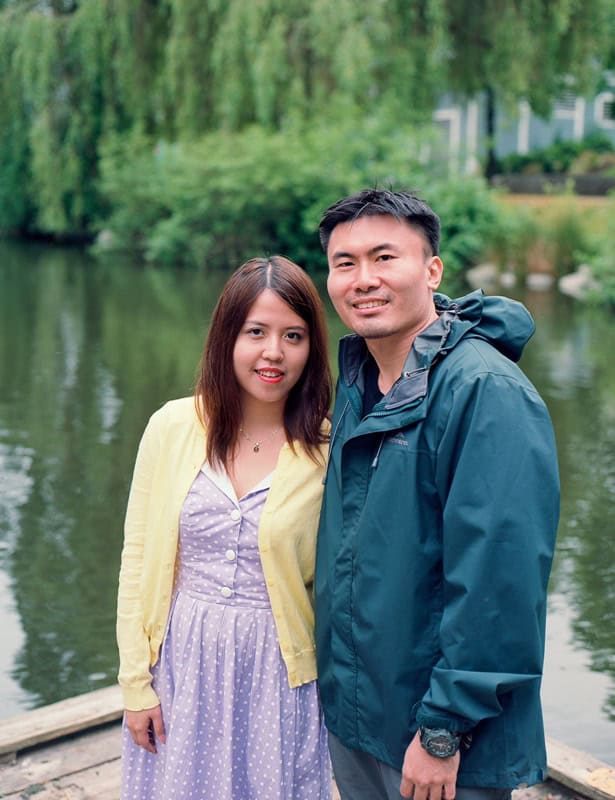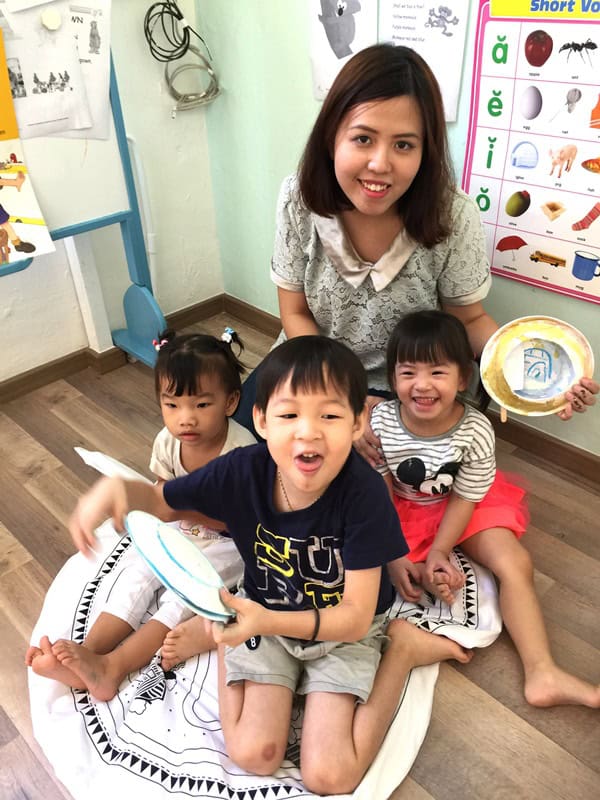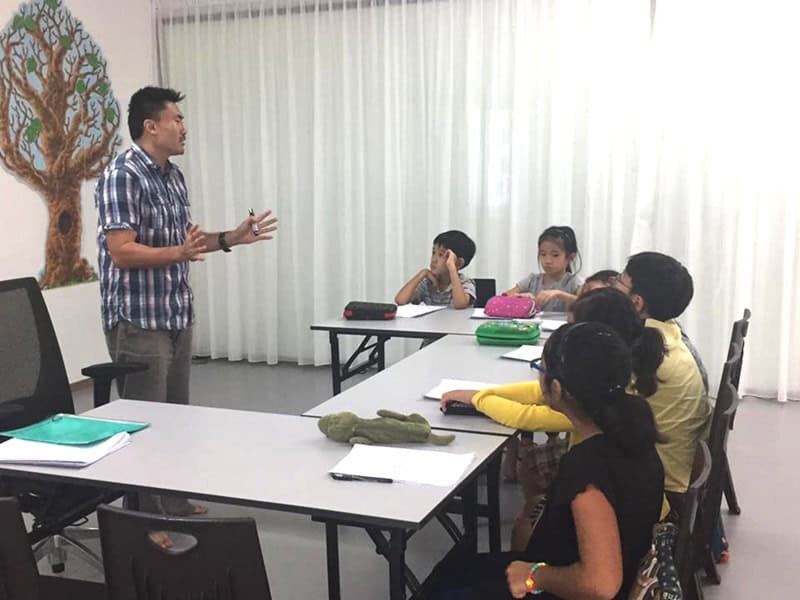Curious Thoughts Academy is a Social Enterprise funded and supported by raiSE (the national body that oversees Social Enterprises in Singapore under the Ministry of Social and Family Development, NCSS and the Tote Board). It is a learning centre dedicated to helping all children learn English effectively from age 2.5 to 16 years old. All profits go towards its social objectives of giving back to the community.
Curious Thoughts Academy specializes in English education and it has programmes from pre-school to secondary school level. The pre-schoolers learn phonics using Jolly Phonics with a Victoria Carlton approach while the primary schoolers and above follow the MOE curriculum. What stands them apart from every other enrichment centre is the understanding that every child learns differently, and multiple intelligences are accounted for.
Our Parenting World Media team is pleased to be able to interview the founders of Curious Thoughts Academy, set-up by husband and wife team in 2017, Yao Shuohan and Lydia Lok to find out more.

Exclusive Interview with Lydia Lok and Yao Shuohan
1) Please share with us more about your background and what made you decide to set up Curious Thoughts Academy?
Lydia Lok: I started my career in the Government as a Policy Officer for protection and rehabilitation legislation in Singapore. When I was a Policy Officer, I realised very quickly that more could be done to impact children and families facing violence. I wanted to drill down to the roots to help them break out of the violence and poverty cycle. I felt very strongly then that this was a problem that the Private Sector could tackle better more efficiently, hence I decided to join SPRING Singapore. While in SPRING Singapore, though I did learn a lot about what makes a good business model, it also motivated me to volunteer more; hence I started volunteering my time with the Japanese Community and also with shelters. Due to these volunteering stints, I saw how Phonics benefitted the children effectively and quickly. I realised then that phonics could help children from less privileged backgrounds learn to read at a young age, putting them on an equal footing with their peers. Often these children enter primary school with poor literacy skills as their mothers are usually busy trying to make ends meet and do not have the time to do additional reading with them after working. Hence they need extra help with literacy.
I was inspired to bring Phonics to these groups of children as I believe very strongly that education can change lives. If we start them young, we will be able to impact their lives more. At our school, it is our philosophy that every 3 paying students contribute to the literacy education of 1 less privileged student.
My husband Shuohan was a MOE teacher teaching English and History. We also realised that it was important to provide a through-train programme for our students after pre-school education. Hence our centre provides a through-train curriculum that continues to Primary and Secondary school English.
Yao Shuohan: After I graduated, I decided to go into the field of education. I did contract teaching in school for about six months and then promptly signed up with MOE on a permanent basis. I taught English Language, English Literature, History and Social Studies while I was with MOE. As an educator in school, I was always troubled that there was so little I could do for students who were at risk due to family issues. As I often had more than two hundred students to attend to every year, I found it difficult to give these students the attention they greatly needed. When Lydia decided to start Curious Thoughts Academy, I decided to join her as it was a way I could directly impact these at-risk children.

2) What influenced and inspired you to be an educator?
Lydia Lok: I took up a Phonics course with the British Council thinking it was a Phonetics course. I was mistaken and only realised this mid-way through the course that it was meant to teach literacy skills and not articulation skills. I continued with the course since it was interesting. When the opportunity presented for me to teach a group of Japanese students, I decided since I had already learnt how to teach Phonics, I would try it on these Japanese children. It shocked me when I realised they benefited tremendously from learning Phonics. When I saw how fast they progressed I initially thought it was due to their families teaching them at home. But when I checked with their mothers, they informed me they practised most of their English with me. I was then convinced that Phonics worked and decided to use it to teach the less privileged children how to read. More importantly, I realised that Phonics is for everyone. It’s a structured and well-researched methodology that helps every single child learn to read. That was an impactful moment of my life because it was then that I realised, cliche as it might be, educators do really change lives!
With proven results that it worked, I slowly started taking in more students in my home. This year, we decided to start our own English centre.
Yao Shuohan: I enjoyed myself tremendously when I was in school, as a student myself. In a sense, I was lucky to have many teachers who motivated me and believed in me. The care, support and encouragement they gave me made me who I am today. I would never have been able to get my degree were it not for my teachers. After I graduated, I wanted to give back, to educate and inspire other young minds.
3) What are some of the challenges that you faced in your teaching career?
Lydia Lok: Being a Government officer for many years made me a very serious person and drilled into me the need to watch my words and be politically correct. It took me a while to put aside my inhibitions and be very animated among children. It is always a challenge to teach children who are very active, hence I need to be extremely animated with these group and incorporate a lot of movement in my classes. My biggest teaching challenge was teaching an ADHD student for 6 years. All his tutors had quit on him because of his condition. However I learnt what engaged him and tweaked my lessons to capture his attention. I am proud to say I never gave up and taught him all the way till his O levels. He is now studying Marketing and Economics in the University of Western Australia and is due to graduate next year.
Yao Shuohan: It was hard for me to learn not to be too emotionally affected when my students confided in me their problems. It was necessary, however, as I had to be an objective voice to them and guide them without being too emotional. I would not be able to help them otherwise! At times, it can also be discouraging when you feel that your efforts are not appreciated. It is important to not give up and keep trying despite the circumstances.

4) What do you enjoy most about being an educator?
Lydia Lok: Sometimes when you are teaching young children, there are moments of self-doubt when you wonder if they are absorbing the lesson. I think most educators constantly worry about their students. But when my students suddenly bring up something related to what was taught weeks ago, it delights me and reassures me that they are learning and enjoying themselves. For instance there was one student who did not really want to sing during a particular lesson. However the next week she started singing the same song to herself.
I had one child who was sent to me because KK Hospital had deemed her to be developmentally behind for her age and was recommended for speech therapy. The mother registered her with me and in less than three months, she had improved tremendously. KK Hospital passed her with flying colours and noted that she is now 1 year ahead developmentally of her age. That’s a jump of 2 development years in just three months!
Yao Shuohan: I love interacting with my students! I feel young and alive whenever I talk to them. When I see them improve, it also makes all the blood, sweat and tears worth it! I remember teaching a student who had failed his humanities for two years straight. No one believed in him, and he was convinced himself that he would fail the O Levels. I encouraged him, supported him and provided him with the tools to prepare for the examinations and in the end, within two months, he was able to get a distinction. I remember he was so happy that he called me up to thank me personally for believing in him. He could not believe that he did so well for his humanities.
5) What advice would you give to parents who want to start their child on English classes? Do you have any tips for parents when choosing the right school to enrol?
Lydia Lok: Singapore is very competitive and the stress starts at a young age. However as parents and educators, we should still endeavour to let our children enjoy their childhood. Hence it is important to find an environment that the child enjoys learning in. The environment, teachers and teaching pedagogy are important factors to look at. As such, we always advise our parents to undergo a free trial class first to access if their child feels comfortable and happy with us.
It is also important to read up on the curriculum and teaching pedagogies and decide which style suits you better. Some parents prefer the Letterland approach for literacy programmes. There is a huge online debate. Some proponents of Letterland feel that the fun characters and pictures help children enjoy reading while detractors feel that children should associate letters with the specific phonemic sounds and not characters (as some children find it difficult to dissociate the letters with the characters). While we use Jolly Phonics at our centre and not Letterland, we think ultimately when it comes to a child’s education, parents should make a decision based on their child’s learning style.
Yao Shuohan: I agree with Lydia. At this age, learning must be fun and engaging so that the child will not associate learning with negative thoughts and emotions. It is essential that teachers identify the child’s learning style and customise the lessons accordingly so that the child will find it fun and exciting.
 All the above images credited to Curious Thoughts Academy
All the above images credited to Curious Thoughts Academy
6) Can you tell us more about Curious Thoughts Academy and how it is different from other English enrichment schools?
Lydia Lok: Our philosophy is for our students to enjoy learning, hence we try to impart our passion for English to them. We believe very strongly that the three elements to a good English foundation is reading, writing and comprehension. Hence no matter the age group, we always try to incorporate these three elements into our lessons. We use a lot of storytelling to engage them and to get them hooked on books. We also encourage them to write their own stories. Comprehension is a trickier skill to teach. As educators, we do these through the questions we ask- hopefully we get them to think out of the box by questioning assumptions that most people usually hold.
For our younger students, we use a lot of movement and art and crafts. Art and crafts actually help hone the development of fine motor skills and many research studies have shown that there is a complex interplay between motor coordination skills, working memory and academic achievement. Poor motor skills not only affect academic outcomes, but also mental health, self-worth and peer interaction.
Lastly, I would say our small size as a boutique English specialist school with only one centre helps us maintain quality control as we are the main teachers. While we have teaching assistants who assist in the lessons, Teacher Shuohan and I are the main teachers for all the lessons. Many other enrichment schools rely on fresh graduates with little teaching experience and the efficacy of the class depends greatly on the teacher assigned to the class.
Yao Shuohan: As we have a through-train programme, students can comfortably transition from pre-school, to primary, and even secondary school with us. There will not be disruptive or jarring transitions required. They can be at ease. There is also a sense of continuation and progress as we continue to build on the strong foundation that they have picked up with us.
7) What is Jolly Phonics, its advantages and how would you implement Jolly Phonics methodology at Curious Thoughts Academy?
Lydia Lok: Jolly Phonics is a fun and child centred approach to teaching literacy through synthetic phonics. There are actions assigned for each of the 42 letter sounds, using a multi-sensory approach. As mentioned earlier, by breaking down letters to phonemic sounds, this helps children decode any word and provides them with a structures and systematic approach in learning to read.
At present we use an Australian curriculum from Victoria Carlton Literacy Programme based in Perth. Victoria Carlton is known as the child whisperer and has taught many children with learning difficulties to read. I first met Victoria Carlton in 2016 and was inspired by her passion and love for all her students. I was already using Jolly Phonics for a few years but when I met Victoria and saw how balanced and well-researched her curriculum was, I decided to bring her curriculum to our centre.
She believes strongly that all children are smart and can be taught, and this is reflected in all her lesson plans as she takes into account the multiple intelligences and learning styles of each child. We observe the learning style for each child and we realised by tailoring our lessons to their learning styles, it really helps the child to absorb the lesson. For instance in one of our classes, one student did not really like the typical lesson. After some observation, I realised that she was more interpersonal (people smart) and I decided to try role-playing Jack and Jill since we were going through the Jack and Jill book for that week. Incorporating role-playing worked and the child was thoroughly engaged. We realised then how important it is to try to speak to each child’s learning style. Our curriculum incorporates all the multiple intelligences and helps every child to flourish (you can check out our video here showing a typical lesson https://www.facebook.com/CuriousThoughtsAcademy/videos/1483258211766678/).
1. Bodily-kinesthetic (body smart)
– We use body movement in all our classes.
– We move a lot from table to all around the class, be it to get materials or to pretend-play.
2. Interpersonal (people smart)
– We act out scenes from books
– We have interactive reading sessions where we ask questions and discuss the story in groups
3. Verbal-linguistic (word smart)
– We read and discuss stories
– We have rhymes and word games
4. Logical-mathematical (logic/ maths smart)
– We play with puzzles in all our classes.
– We incorporate counting and maths in our reading.
5. Intrapersonal (self-smart)
– We have time outs for introspection
– There is Quiet Time in the middle of the class and a time for reflection at the end of the lesson.
6. Visual-spatial (Visual/ picture smart)
– We incorporate art into all our classes.
– We play with puzzles in all our classes.
7. Musical (music smart)
– We incorporate phonemic awareness in all our classes using songs and musical instruments.
8. Naturistic (Nature smart)
– We have many pictures of nature in all our classes.
– We role-play animals in our stories and body move
8) Can you share with us what’s your approach in teaching students ranging from age 2.5 to 16 years old at Curious Thoughts Academy and how would you teach students from different age group effectively?
Lydia Lok: The three elements of reading, writing and comprehension are important across all age groups. We cater to their strengths and emphasise different elements based on their learning needs. For instance for the preschool group, we emphasise a lot on reading and we introduce writing and comprehension. However for primary school, there is a need to drill them on writing. In Secondary school, we try to help them be stronger writers through critical thinking. Our dream is for our students to be critical writers, hence our tagline is “Keeping Kids Curious’.
So while the three elements of reading, writing and comprehension exists in all our programmes, we stress each element differently through various teaching methodologies.
Yao Shuohan: Our flagship programme is the Students at Risk Targeted Intervention (STAR) Programme that helps children with reading difficulties to transition from pre-primary to primary school, helping them get ready for the MOE primary school syllabus. It is an intensive programme where the children are taught phonics and some grammar rules in 20 sessions so that they can be fully prepared for the challenging primary school syllabus. We incorporate body movement, actions and reading to make the lessons fun and encouraging, so that they can gain confidence. The parents and the children love it, and this is our most popular programme! So you can see how we try to gently transition them from a more play-based and movement-based programme for pre-school, to a more structured yet fun programme in primary school by introducing the MOE primary school syllabus. Finally for those who go on to secondary school, we are here to prepare them to excel in the “O levels” based on the earlier foundation we have built through the years.
9) What advice would you give an individual thinking about pursuing a career as an educator?
Lydia Lok: We just gave this advice to one of our employees this week. Being an educator changes lives. And again I say, cliche as it might sound, this is true. We do not just teach them academic subjects but we also impart values such as honesty, trust and respect for one another. As educators, we are role-models and children spend a lot of time with us (sometimes more than their parents), hence we are an important part of their lives. If we can lay a strong foundation for our students and get them to be passionate about learning, they will excel no matter where they go. Furthermore for English, it affects maths and science in Primary school and many other subjects in Secondary school. There is a very direct impact on children’s lives.
If one is going to be an educator, set out to be passionate about teaching. Students are very clever these days. They know when someone does not want to be there; hence as an educator, we should be passionate about teaching. I have personally seen many who become educators just because it is a stable rice bowl, and not for the passion. Those educators often do not last long.
Yao Shuohan: An educator definitely needs to be passionate about the job. At times, a teacher may feel exhausted and that it is a thankless job. However, when you see your student flying high and reaching for the stars, it is always worth it! Patience is also very important, of course. Lastly, treat yourself regularly, and make sure you don’t burn out!
10) Lastly, do you have anything else that you would like to add on and share with our readers about Curious Thoughts Academy and your programs?
Lydia Lok: Curious Thoughts Academy was set up as Social Enterprise but we try to talk more about our teaching methodology and curriculum as we believe we have a stellar programme that benefits children from aged 2.5 to 16 years old, and that should take the limelight.
However from time to time we do mention our social objectives as we see it as a duty to remind Singaporeans not to forget about society’s less privileged families. At Curious Thoughts Academy, every 3 students help contribute to one less privileged student. We bring our programmes to children’s homes and shelters as we believe that all children should have access to a good education. This is our first year of operation and we are still trying to balance our social objectives with financial sustainability. We believe that it is possible and will aim to change the way Singaporeans think about education.
Teacher Lydia and Teacher Shuohan set up Curious Thoughts Academy to bring a structured yet fun approach to learning to read, write and communicate. Their mission is to provide quality English education to all children, through experienced and well-trained teachers, via a thorough and well researched curriculum that takes into account the multiple intelligences and learning styles of a child. Curious Thoughts Academy’s curriculum will take the child from pre-school to secondary school levels, developing them into curious, critical thinkers.
Centrally located at 51 Waterloo Street. To find out more about Curious Thoughts Academy and its programmes, please visit:




